Oh honey. The reporters are telling you the police are closing in. Every black and white outfit has you jumping. You’re burning your dress in an incinerator in the backyard.
Let’s refresh why. The date is 1953. You, our heroine of The Blue Gardenia, are played by Anne Baxter. The actress, having shredded every scheming expression from three years before, is now you, the dewy fiancee of a soldier abroad who works at the phone company. As you celebrate your birthday on your own with his (absent) and hers (present) champagne, you take out your soldier’s glorious, cherished letter to find, SURPRISE: He’s fallen for a nurse.
What to do? Well, get drunk with the local cad who has just called to invite your roommate to a place called The Blue Gardenia.
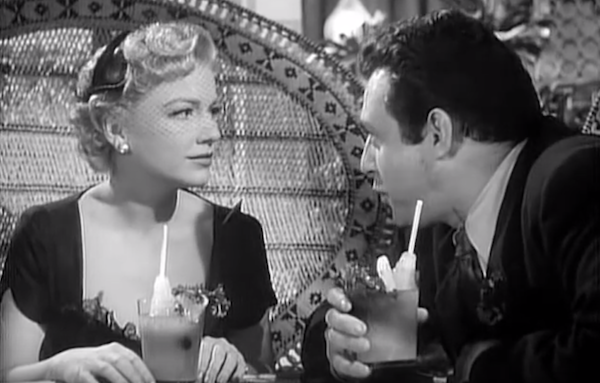
Go to his place after he gets you drunk. After all, you’re too intoxicated to realize “blue gardenia” is a cheap pseudonym for “black dahlia” and therefore a sign of danger; you’re too intoxicated to even realize there will be no “party” at his pad. (Have you seen no films? Raymond Burr is playing the cad! Run!) So of course, you get in a mess, have to fight off his attempts to rape you by grabbing a poker, and then you black out to find him dead.
(Before we get to the rest of the plot, there’s a haunting moment in the bar when you had a chance to walk away. There’s handsome Nat King Cole singing “Blue Gardenia,” and somehow his soulful sincerity doesn’t start you sobbing OR walking away from the lying playboy before the mess starts? King’s notes sear through me, more than half a century later. How is it possible they leave you unmoved? But I digress.)
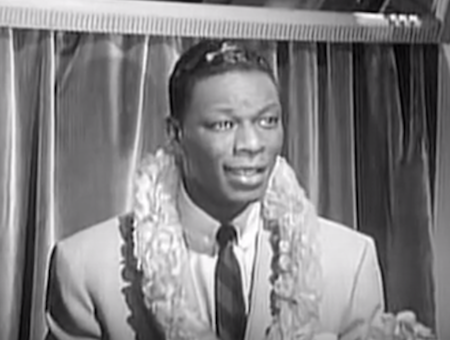
The question of the film–Did you murder the guy?–isn’t that interesting to me, as I’m not sure how anyone in this circumstance could be called a “murderess” anyway. It’s an accident IF it happened, and the need for self-defense evident. But the local crime beat reporter has you convinced your only salvation is to seek refuge in the protection of his newspaper’s arms. And he—the surely not self-interested sleaze reporter—will save you from the big bad police about to knock on your door.
What’s strange to the modern viewer, accustomed to far too much crime TV, true crime books, and novels galore, is that they have NOTHING on you, my friend. A dress. A shoe size. A hair color. Some thoughts about your mannerisms from a flower seller and waiter. All that they really have on you—besides a call to your house that wasn’t even for you (and won’t hurt your friend since she has an alibi)—is that you are a MESS. Calm down, friend. Call over your wisecracking friend, Crystal (Ann Southern); ask for help. Keep that reporter out of your thoughts; honey, heaven help you, he’s almost as gullible as you are proving to be. Instead, put on your Nancy Drew heels. This case is something even that black-and-white thinker could manage. Heck, Encyclopedia Brown would have it down in two minutes.
And then you won’t be dependent on sad sack double crossers who treat your friend like a whore because she was once married, who only like you IF you’re not someone who would defend yourself from an abusive attacker. Then you can solve the crime, put on Nat King Cole’s record, sing along as you mourn your lost love, and then dance your way back to happiness with your hilarious roommates.
Alas, it’s still 1953 for you, my friend. And so the final thoughts in the film are the new cad’s, who is soon to be your love. And all we can do is watch, and pity.

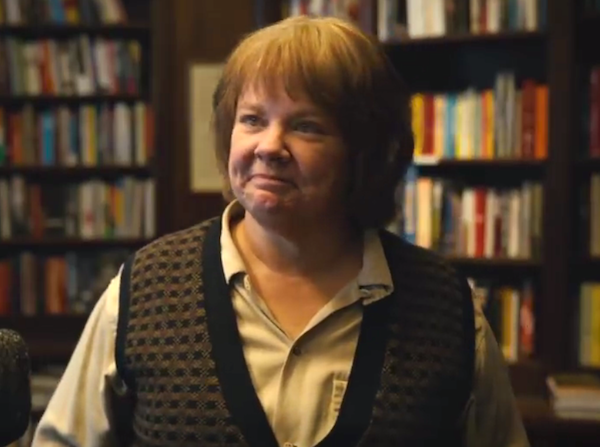 Can You Ever Forgive Me?, starring national treasure Melissa McCarthy, is based on the memoir of real-life writer Lee Israel, who became a con artist to pay the vet bills (out in wide release on Oct. 19th). Unable to get anyone to care about the subject of her new biography, Fanny Brice, much less her dwindling finances, Israel turns to stealing letters of famous movie stars and writers, and soon begins penning fake ones herself. Classic movie lovers and bibliophiles will sympathize with her alienation from those who don’t spend their days reading Noël Coward and Dorothy Parker. (And you’ll enjoy a line about Louise Brooks, a nod to classic movie fans.)
Can You Ever Forgive Me?, starring national treasure Melissa McCarthy, is based on the memoir of real-life writer Lee Israel, who became a con artist to pay the vet bills (out in wide release on Oct. 19th). Unable to get anyone to care about the subject of her new biography, Fanny Brice, much less her dwindling finances, Israel turns to stealing letters of famous movie stars and writers, and soon begins penning fake ones herself. Classic movie lovers and bibliophiles will sympathize with her alienation from those who don’t spend their days reading Noël Coward and Dorothy Parker. (And you’ll enjoy a line about Louise Brooks, a nod to classic movie fans.)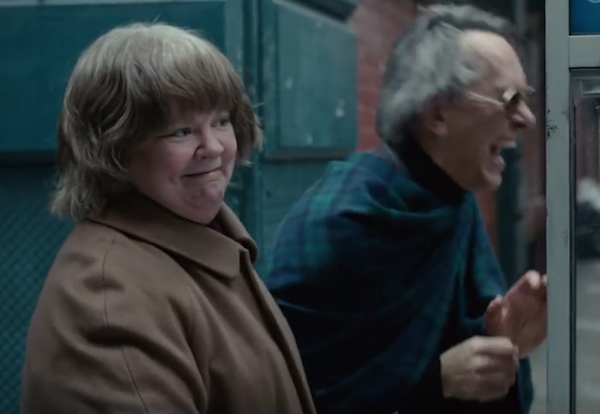
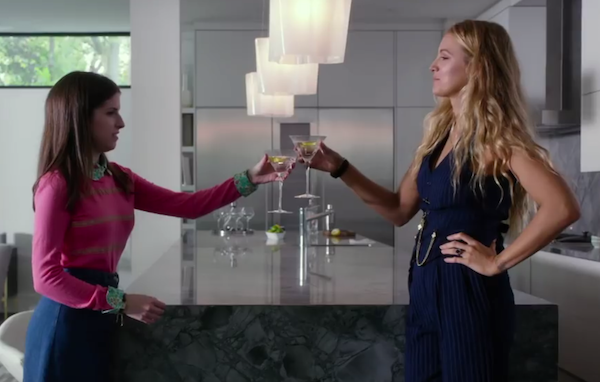 Feig; the director of Bridesmaids, The Heat, Spy, and Ghostbusters (the reboot); is so open about preferring female leads and so appreciative of their comedic skills that it’s unsurprising to see both stars so funny and magnetic in his film. Their profane banter is hilarious, and the casual cruelty, self-interest, and denial of these particular frenemies are a blast to watch. I won’t spoil the surprise of what becomes of Emily (Lively), whose disappearance spurs mommy blogger Stephanie (Kendrick) into amateur detective/life-stalker mode.
Feig; the director of Bridesmaids, The Heat, Spy, and Ghostbusters (the reboot); is so open about preferring female leads and so appreciative of their comedic skills that it’s unsurprising to see both stars so funny and magnetic in his film. Their profane banter is hilarious, and the casual cruelty, self-interest, and denial of these particular frenemies are a blast to watch. I won’t spoil the surprise of what becomes of Emily (Lively), whose disappearance spurs mommy blogger Stephanie (Kendrick) into amateur detective/life-stalker mode.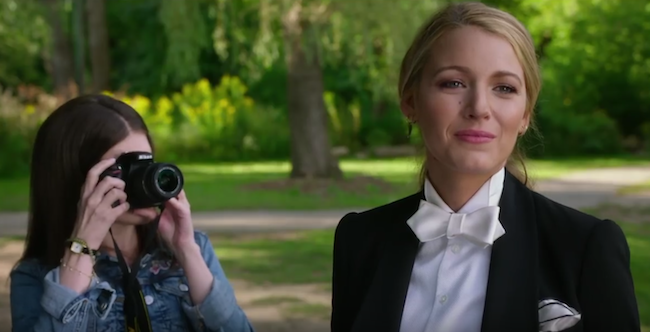 There are some seriously batty plot developments that seem more like old-school soap operas than big screen fare (again, like Beat the Devil). But anyone paying attention knows plausibility is not the point. Just sit back and enjoy this dark comedy fun. (And don’t miss the recent titles and commentary on Stephanie’s bizarrely eclectic blog.) Those of us who have been following Feig since his brilliant creation, Freaks and Geeks, will be glad to see his first female lead, Linda Cardellini, in a scene-chewing, funny bit part. Let’s hope the films to follow these two this fall are half as fun.
There are some seriously batty plot developments that seem more like old-school soap operas than big screen fare (again, like Beat the Devil). But anyone paying attention knows plausibility is not the point. Just sit back and enjoy this dark comedy fun. (And don’t miss the recent titles and commentary on Stephanie’s bizarrely eclectic blog.) Those of us who have been following Feig since his brilliant creation, Freaks and Geeks, will be glad to see his first female lead, Linda Cardellini, in a scene-chewing, funny bit part. Let’s hope the films to follow these two this fall are half as fun.
